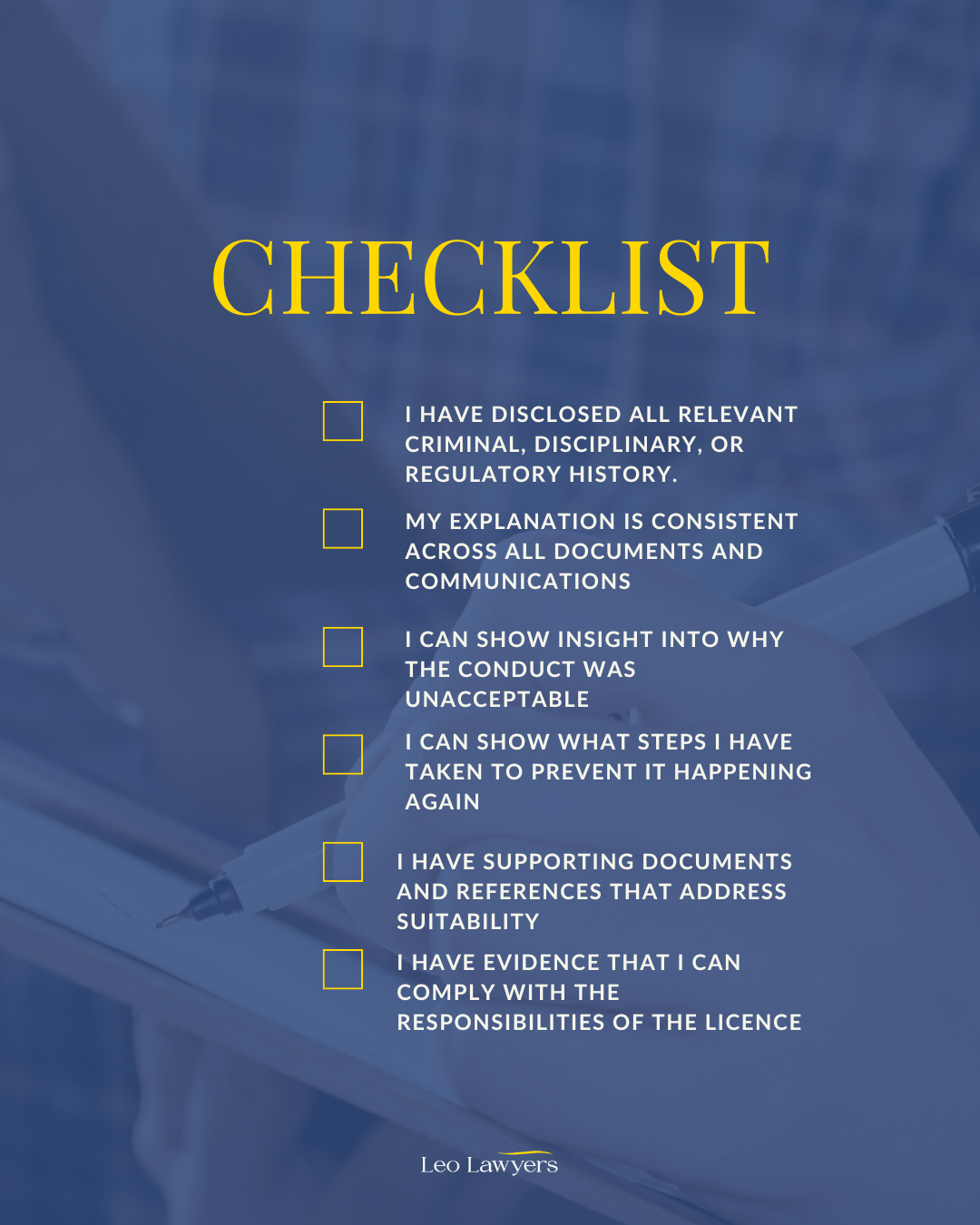Last Updated on 19/01/2026 by Damin Murdock
When applying for a building licence or other occupational licence in Australia, applicants are often required to satisfy the regulator that they are a “fit and proper person”.
In practice, this test is one of the most common reasons licence applications are delayed, refused, or challenged in tribunal proceedings. The key issue is not whether a person has a “perfect” background, but whether the regulator can be confident the applicant will comply with their obligations and maintain public trust going forward.
This article explains what decision-makers actually assess under the fit and proper person test, why applications fail, and what evidence can help.
- What the Fit and Proper Person Test Really Assesses
- Why “Fit and Proper” Decisions Are Not Just About Character
- Does a Criminal Record Automatically Prevent a Licence?
- The Key Factors Regulators Usually Consider
- What Usually Goes Wrong in Licence Applications
- What Evidence Can Strengthen Your Application
- Practical Checklist: Fit and Proper Person Application Preparation
- What Happens If Your Licence Is Refused?
- Key Takeaway
What the Fit and Proper Person Test Really Assesses
The fit and proper person test is deliberately broad. It allows licensing authorities to make a judgment about whether an applicant can be trusted with the responsibilities of the licence.
Although the wording varies between different licensing schemes, decision-makers typically focus on whether the applicant demonstrates:
-
honesty and reliability
-
sound judgment and insight into their obligations
-
competence and responsibility in the licensed role
This is not a box-ticking exercise. It is an evaluative test aimed at protecting the public and maintaining confidence in regulated industries.
Why “Fit and Proper” Decisions Are Not Just About Character
A common misunderstanding is that the test is only about whether someone is a “good person”.
In reality, regulators and tribunals often treat the test as a broader public interest inquiry, including:
-
whether the person can be trusted to follow regulatory rules
-
whether their past conduct suggests future non-compliance risk
-
whether the public can have confidence in their work and dealings
This is why licensing decisions may consider both personal conduct and professional history, particularly where the conduct raises concerns about honesty, safety, or compliance.
Does a Criminal Record Automatically Prevent a Licence?
Not necessarily.
A criminal record is not always a bar to licensing. However, it can become a serious issue where the offence is relevant to the licence being sought or indicates a risk to the public.
Decision-makers may look closely at:
-
the nature and seriousness of the offence
-
how long ago it occurred
-
whether it was isolated or part of a pattern
-
whether it relates to safety, fraud, violence, dishonesty, or compliance failures
-
what the applicant has done since (including rehabilitation and stability)
In many cases, the larger problem is not the existence of the conviction, but how the applicant explains it and whether they demonstrate genuine insight.
The Key Factors Regulators Usually Consider
Although each licensing regime is different, decision-makers commonly assess the following:
Public interest and safety
Licensing frameworks exist to protect the public, especially in high-risk industries like building and construction.
Honesty and disclosure
Failure to disclose relevant history is often treated as more serious than the history itself.
Relevance to the licence
Regulators generally ask whether the past conduct creates a meaningful risk in the role the person is applying for.
Evidence of rehabilitation
Applicants who can show reform, stability, and changed behaviour often place themselves in a stronger position.
Future compliance risk
The test is forward-looking. The key question is whether the regulator can be confident the applicant will comply with the law and licence conditions in the future.
What Usually Goes Wrong in Licence Applications
Licence applications often fail the fit and proper person test because of avoidable issues such as:
-
incomplete or misleading disclosures in the application
-
inconsistent explanations between documents and interviews
-
minimising conduct or shifting blame rather than showing insight
-
lack of supporting material (references, records, rehabilitation evidence)
-
a history of repeated regulatory breaches or non-compliance
-
unresolved disputes with regulators or disciplinary bodies
Even where the applicant is capable of doing the work, these issues can lead a decision-maker to conclude the applicant is not presently suitable to hold the licence.
What Evidence Can Strengthen Your Application
If there is anything in your background that could raise concerns, the application should be supported with clear evidence addressing the regulator’s likely questions.
Helpful material may include:
-
a written statement explaining the circumstances and what has changed since
-
character references that address reliability and honesty (not generic praise)
-
evidence of stable employment or consistent work history
-
training records, compliance courses, or professional development
-
documents showing rehabilitation efforts (where relevant)
-
proof of improved systems and business practices to prevent repeat issues
The aim is to demonstrate that any risk factors have been addressed, and that the applicant can be trusted to operate responsibly under a licensing regime.
Practical Checklist: Fit and Proper Person Application Preparation
Before lodging your application (or responding to a regulator concern), consider whether you can answer “yes” to the following:

This image and its contents are protected by copyright under Australian law and international treaties. Leo Lawyers Pty Limited reserves those rights.
If the answer is “no” to any of these, the application may be vulnerable to refusal or delay.
What Happens If Your Licence Is Refused?
If a licence is refused (or conditions are imposed), applicants may have review rights depending on the licensing body and legislation.
In many cases, the decision can be challenged through a tribunal process, but success often depends on whether the applicant can provide stronger evidence than what was presented during the initial assessment.
Key Takeaway
The fit and proper person test is not simply about past mistakes. It is about whether the regulator can be confident the applicant will act honestly, comply with obligations, and protect public confidence in the licensed industry.
A well-prepared application is one that addresses risk factors directly and provides credible evidence of suitability.
Damin Murdock (J.D | LL.M | BACS - Finance) is a seasoned commercial lawyer with over 17 years of experience, recognised as a trusted legal advisor and courtroom advocate who has built a formidable reputation for delivering strategic legal solutions across corporate, commercial, construction, and technology law. He has held senior leadership positions, including director of a national Australian law firm, principal lawyer of MurdockCheng Legal Practice, and Chief Legal Officer of Lawpath, Australia's largest legal technology platform. Throughout his career, Damin has personally advised more than 2,000 startups and SMEs, earning over 300 five-star reviews from satisfied clients who value his clear communication, commercial pragmatism, and in-depth legal knowledge. As an established legal thought leader, he has hosted over 100 webinars and legal videos that have attracted tens of thousands of views, reinforcing his trusted authority in both legal and business communities."


